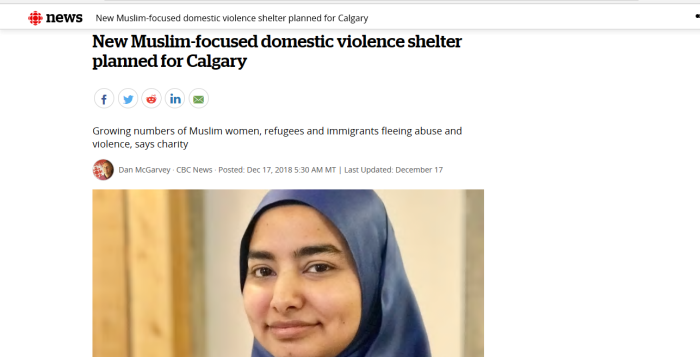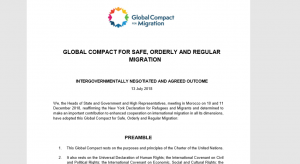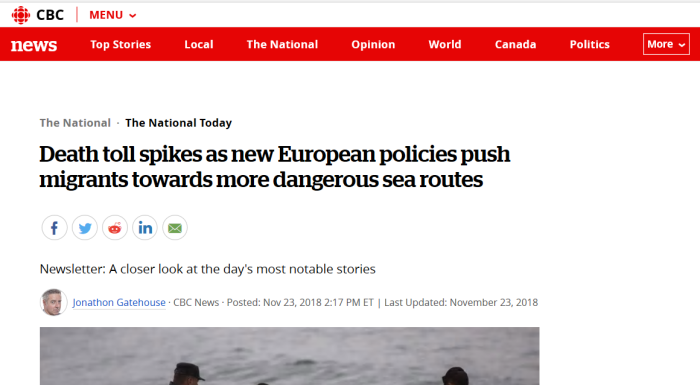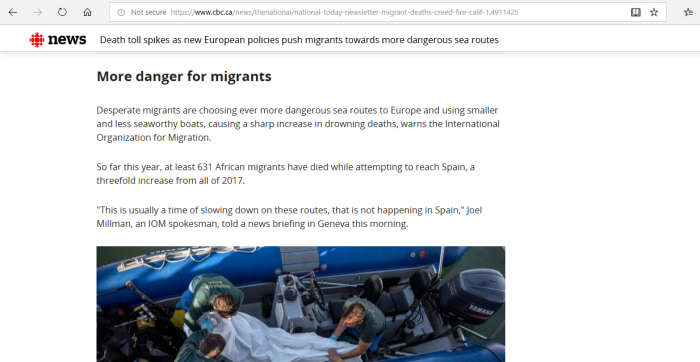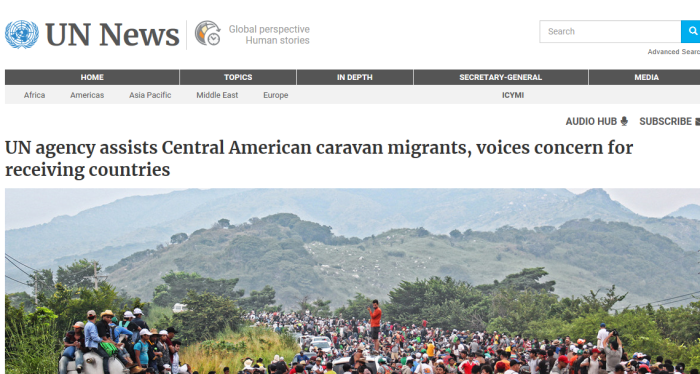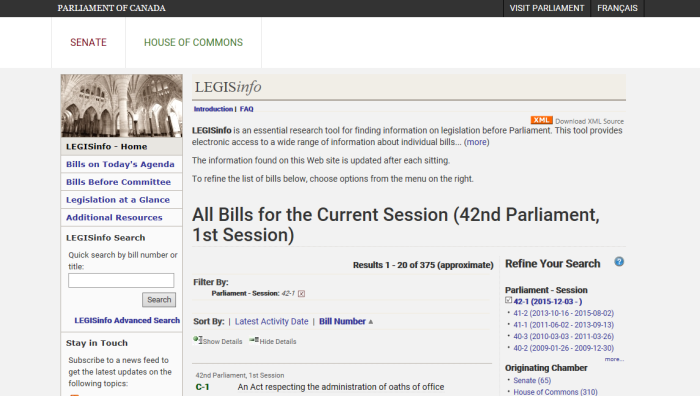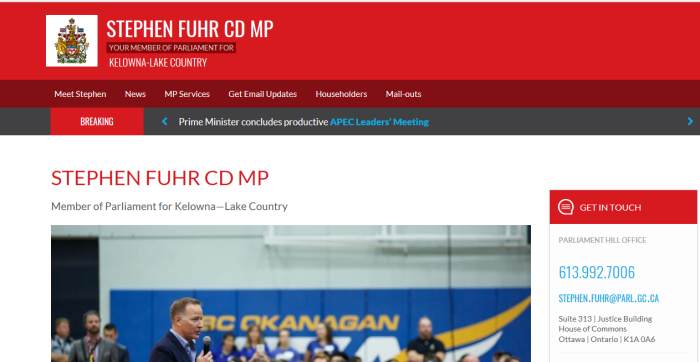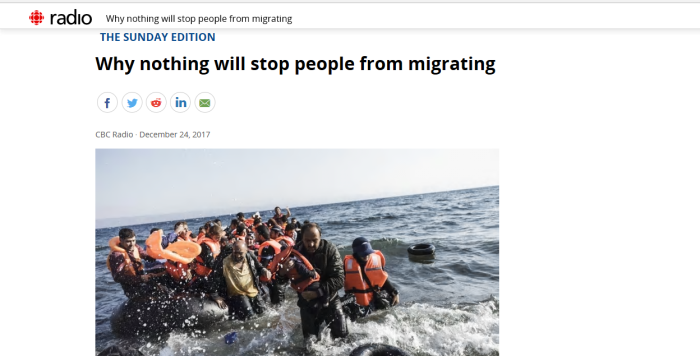
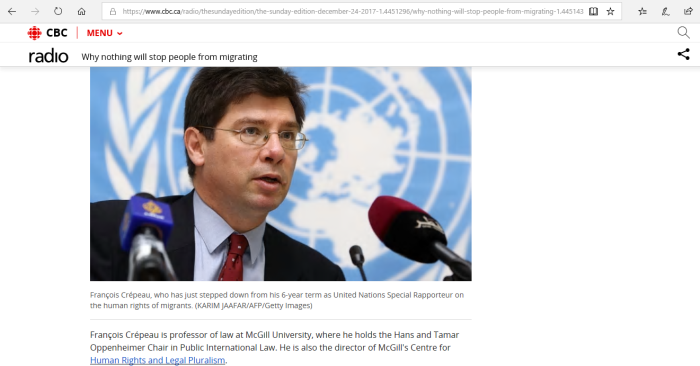
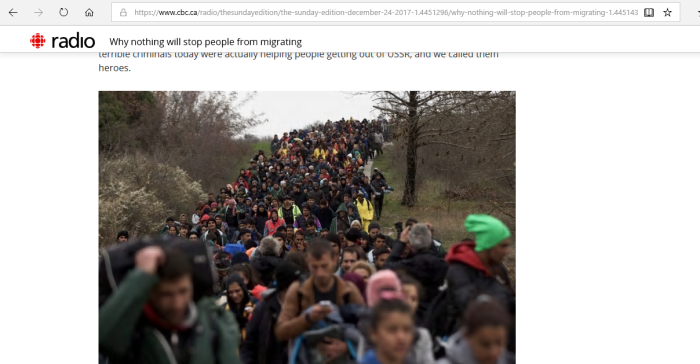
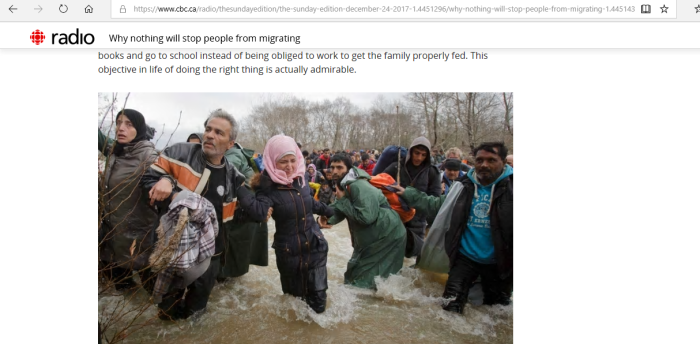
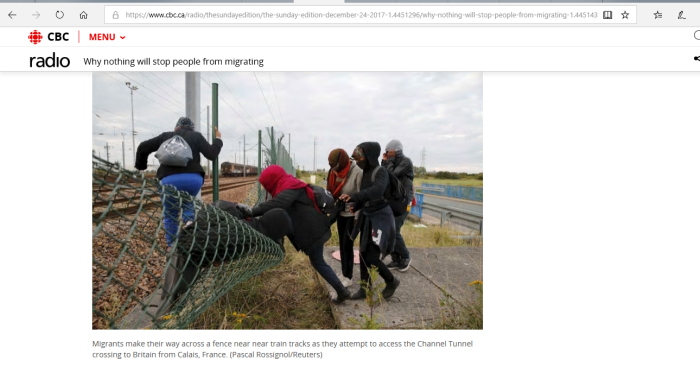
(CBC produces another “pro-illegal immigration” article)
Okay, securing borders is a tough job, so why even bother?
For my grandparents, divorce was unthinkable. My parents’ generation did that. For my parents’ generation, gay marriage was unthinkable. My generation did that. For my generation, more open borders is probably unthinkable. The next generation will do that.
An actual quote from the article.
CBC, a.k.a The “Communist Broadbasting Corporation”, or the “Caliphate Broadcasting Corporation”, is a government funded “news” organization. It receives about $1.5 billion annually to spew out anti-Canadian stories. Taxpayers don’t get a say in the matter.
CLICK HERE, to reach the CBC Propaganda Masterlist. It is far from complete, but being added to regularly.
Okay, where to start with this gem? CLICK HERE, for the article itself.
“In 2015, there were 244 million international migrants — nearly seven times the population of Canada.
The total includes the more than 65 million people forcibly displaced from their homes by conflict and persecution. It is the highest number on record, surpassing even the years following WWII.
.
It also includes people whose homelands have cracked apart in earthquakes, withered in droughts or suffered through famines.
.
Some migrants are pushed from their homes by poverty and drawn to countries in the global north by the promise of a better life. Others cross borders to join their families or pursue an education.”
An interesting start. And some things we can take from it.
First, it says 244 million (yes, million) international migrants. That is absurd. But don’t worry, some globalist bodies (EU, UN) will force countries to take them in.
Second, there are 244 million “migrants”, yet only 65 million of them are “refugees”. Assuming, for the sake of argument that the numbers are correct, that would be 65 million refugees, and 179 million migrants. As percentages, those are 27% refugees, and the other 73% are migrants
Third, it lists natural disasters as reason to leave, but it seems unclear if these are “refugees” or migrants”. The article doesn’t specify.
Fourth, yes, many are drawn by: 1/ poverty; 2/ search of a better life; 3/ join families; or 4/ pursue an education. Those are called economic migrants, and moving to another country for those reasons is not considered a human right.
The numbers are going to keep growing. Researchers predict there could be 1 billion climate refugees by the middle of this century, and 2 billion by its end.
The CBC quotes this article, from Cornell University. Although the article provides no actual evidence for its claims, it does make many dire predictions
“Earth’s escalating population is expected to top 9 billion people by 2050 and climb to 11 billion people by 2100, according to a United Nations report. Feeding that population will require more arable land even as swelling oceans consume fertile coastal zones and river deltas, driving people to seek new places to dwell.”
Yes, predictions about rising sea levels submerging the land have been floated for decades. No evidence of it happening though.
For the last six years, Canadian lawyer François Crépeau has served as the United Nations’ leading investigator and expert on the human rights of migrants. His post put him on the frontlines of an international crisis, during some of the most challenging years in recent memory.
The CBC links this UN page. It will be done in another article. Bottom line, the UN views migration (even illegal immigration) as a human right.
“François Crépeau: I should start by saying that migration is part of humankind, of who we are. We were born as a species 250,000 years ago in Africa. We came out of Africa around 70,000 years ago, arrived in Australia 60,000 years ago when there was a land bridge, entered Europe 40,000 years ago when the ice retreated, and entered North America between 20 and 25,000 years ago.
Since then, we’ve moved around all the time. We are a migrating animal species. The numbers are high today, but they represent on average 3 per cent of the world population. We’re told by anthropologists and sociologists that this was the proportion 50 years ago, and this was the proportion 100 years ago. [Migration] is the constant of who we are.
The problem we’re facing today, what we call a crisis, is because we invented — about 400 to 500 years ago — borders. We implemented borders in the second half of the 19th century when we invented the passport. So for the past 200 years, we’ve had this idea that we should stop people at borders, but 200 years is very little as compared to 250,000 years.”
Nice history lesson, but where we were 250,000 years ago, or 20,000 years ago is irrelevant. He makes an argument since that because humans have moved around for centuries, that actual borders and border enforcement are a strange an abhorrent concept.
He either doesn’t get (or pretends not to get) that borders and nations are what allows societies to function. People united by heritage, language, culture, traditions, and yes, ethnicity have formed the basis of societies for a very, VERY long time. Though the concept of a nation-state is newer, the principles behind it are not.
“Michael Enright: This is the whole idea of the sovereign state — that sovereignty allows nation states to control their borders and keep people out.
It’s been said to be one of the attributes of state sovereignty, but it’s never happened. All borders are porous and democratic borders are more porous than others. Even the Soviet Union had porous borders. At that time, the people we called the smugglers and we present as terrible criminals today were actually helping people getting out of USSR, and we called them heroes.”
Yes, borders are porous, but they “shouldn’t” be. They exist for a purpose: to be a barrier and an outside limit for that nation.
“I think states have to accept that borders are not meant to stop everyone they would like to stop. Borders may mean knowing who enters and stays in the country. In order to get that knowledge, you have to have people come to border guards so that they can be identified, numbered, etc. In order to do that you have to provide them with papers. If you try to stop everyone you don’t like, the only thing you do is you create underground markets for smugglers.
A question of terminology here: what’s the difference between a refugee and migrant?
.
‘Refugee’ is defined in the 1951 Geneva Convention on the Status of Refugees. It’s someone who is outside his or her country of origin and fears persecution for five reasons: race, religion, nationality, belonging to a particular social group, and political opinions.
Refugees are a kind of migrant. But there are many other people who do not fear persecution or who fear many other things: people who are fleeing drought, tsunamis, poverty. These are good reasons to try to move somewhere else. This is a social stress, and migration has always been a human answer to social stress. It’s going to continue, and we have to adapt to that rather than try to refuse it.”
(1) Okay, this person flat out says that borders are not meant to stop everyone. Yeah, that “is” what they are for.
(2) If you stop everyone you don’t like, you create underground markets for smugglers? Sure, if someone isn’t allowed it, for whatever reason, just pay someone to smuggle them in.
(3) “Providing papers” is standard practice when you show up at a foreign border. Border guards need to know who people are, and whether they are admissible or not.
(4) Yes, refugees are something different than migrant, but throughout this article, you blur the lines. You don’t seem to care if they are fleeing some legitimate horror, or are just looking for a better life.
(5) “fleeing drought, tsunamis, poverty”? Poverty isn’t a natural disaster, and none of these are legitimate reasons to be considered a refugee. It is just blurring the lines here.
“In the last six years, in your position with the UN, you’ve travelled around the world. You’ve visited detention centres, camps, places where people try to cross borders. What stands out in your mind now from those visits?
I was expecting this to be very grim. And what stood out from day one, when visiting detention centres or camps, was the sheer determination, the grit, the courage of those people — the fact that even if they were detained, in their mind they were already somewhere else. They were already in the next step of their journey. They might be sent back home, but they would come back.
They are going to come whether we like it or not, because this is what humankind has always done. They are going to try to find a place where they can thrive, flourish, feed their kids and educate their kids. They don’t do it, often, because they like it. They do it because that’s where the future lies for themselves and their families.”
This is creepy. There is almost an awe that these migrants — attempting to enter illegally — will just keep trying again and again. And in the next paragraph, reiterating that it is people looking for a better life. Economic migrants, not refugees.
“Some countries have responded to this influx of refugees and migrants into Europe by trying to close their borders. You say there’s no such thing as a fully sealed border.
I mean, you can seal a border that deflects migration to other weak points along the border, but borders are very long. I suppose you could put a soldier every 10 meters with orders to shoot on sight. Democracies don’t do that, really.
If you try to stop [migration], the only thing you’re creating is an underground market for criminals. That’s what’s happened with the prohibition era between Canada and the U.S. We made the fortune of several Montreal families. That’s what’s happening with 40 years of the war on drugs. The cartels are not cowed, and are deadlier than ever.”
The pattern throughout the article is that people have the right to migrate — wherever, whenever, however — they want. There is no sympathy shown for the host nations who are forced to provide costs for security. No sympathy for the housing, education, health care, etc… that these open border policies force on host nations.
It is undemocratic to defend your border? Does a nation just “give up” enforcement if the illegal immigrants are determined to cross?
This is the same kind of nonsensical arguments that “safe injection sites” are founded on: provide for these people, otherwise, they will hurt themselves. Selfish.
This is not really surprising to read though. The UN has made it clear repeatedly that it DOES NOT respect national borders.
“But do nations have a moral responsibility to take in migrants?
.
I don’t think it’s a question of moral responsibility. It’s a question of facing the facts. Migrants are going to come.
Migrations occur because of push and pull factors. We very often discuss the push factors — environmental catastrophes, violence, war, economic deprivation. We never talk about the pull factors.
The main pull factor for countries in the global north is that we have huge labour markets that need those migrants. The undocumented migrants we have in Canada and Europe and the U.S., they all work. They all perform economic functions and there are millions of employers ready to employ them.”
A bit of honesty here. He says screw morality.
But that is where the honesty ends. True, there are many who do work, but there are many more (especially from the Middle East and Africa), who do not work, and are an economic burden.
Furthermore, there is no mention of the damage done to host nations, even by those working. A huge influx of workers leads to more competition for jobs, drives down wages, and often sees citizens being replaced in favour of cheap foreign labour.
“What about the suggestion that migrants coming into my country will somehow change or subvert the common culture?
That’s often heard. It’s not supported by social science. The biggest changes in our culture are linked to generational changes.. For my grandparents, divorce was unthinkable. My parents’ generation did that. For my parents’ generation, gay marriage was unthinkable. My generation did that. For my generation, more open borders is probably unthinkable. The next generation will do that.
Changes in values are much more important because of the passage of time — because we react to what our parents did — than by people coming in. We haven’t seen a change in democratic values because we had millions of people coming from undemocratic countries.”
Finally a good question, but the answers are chilling
(1) The speaker is either not aware, or deliberately lying, about mass migration changing the culture. Particularly with Islamic immigration, there is nothing but culture clash and violence.
(2) The speaker says he believes open borders will become a reality.
“Isn’t there an argument to be put forward that countries like France or Sweden have found it very difficult to integrate migrants into the common culture?
No one ever said that welcoming migrants was easy. It’s always been difficult. There are ways of making it easier — putting people in language courses very early on, training, trying to have mechanisms so that the skills and experience they have can be translated into Canadian experience and skills.
Countries like France have had migrants for generations. But in the post-war period they have turned a complete blind eye to integration, because all those migrant workers of the 50s, 60s and 70s were supposed to go back home, and France never realised that they would stay. So integration was not part of the process.
You have a marginalized community if you don’t have proper integration policies. Now, that is true for migrants. But that is true for Roma people in in Europe. That is true for Aboriginal people in Canada. That is true for poor people in most of our cities. It’s true for older people. Integration is not simply an immigration problem; it’s a social problem that we collectively have for several communities who are excluded from the mainstream.”
Notice that again there is no concern for the host countries now forced to deal with many thousands of “migrants”.
But an interesting point, you need proper integration. But if people are just going to migrate anyway, then all of this is cast aside. Again, it is selfish to just force these burdens on host countries.
And this is to say nothing of Islam, which rejects assimilation, and attempts to conquer and dominate anyway, via mass migration. Let’s be clear, Islam is a political ideology, not a religion.
“What about the argument of politicians and people who say, well, embedded in the intake of migrants, there may be terrorists who pose a threat to my individual and national security?
That’s true. There are bad apples in every community. There are bad apples in our communities who have been here for several centuries, and there are bad people in Aboriginal communities, and there are bad people in immigrant communities. That exists. It’s true. So, we could exclude everyone, try to prevent everyone from coming.
The issue is, if you talk to anti-terrorism people, they are not interested in migration policies, and they will tell you as much. Migration policy, stopping everyone at the border, it doesn’t give [them] any information on the precise person who poses a danger. To identify a person who poses danger, this is intelligence, and intelligence means groundwork with communities. Most terrorist attacks in the global north have been done by people who were either born or integrated in those countries.”
Going out of the way to miss the point. Should we not bother with borders and screening at all then, since bad apples have gotten through? Moreover, if we can determine who is not a good fit, then it makes it more likely to prevent their radicalised children from becoming a threat to the public.
“How young would they be, the ones that are alone?
.
Most of them are between 13 and 18. You have a very small minority who are younger, sometimes 9, 10, 11. They are often not those who are found on boats, because they simply don’t have the social capital to be able to negotiate that. But they will be found, for example, trying to cross into the U.S. from Mexico.
The older ones, 13 to 18 — this is an age where you become an adult in many societies. So we consider them as children, and they are in terms of their development, but certainly they don’t take the responsibilities of children. They take the responsibilities of adults. In countries like Afghanistan, where often the men have disappeared due to conflict, the oldest boy at 14 or 15 becomes the man of the family and does what it takes.”
Actually, there have been many cases of adult men claiming to be boys for 2 reasons: 1/ harder to deport; and 2/ more generous welfare. It has gotten so bad in Europe they started doing bone scans to better estimate ages.
“How much of the resistance to migration, to migrants, to refugees, is simple old-fashioned bigotry or racism? When you hear David Cameron, the former British prime minister, talking about migrants as a “swarm” and then his foreign secretary calls them “marauding” and, of course, we know what the current president of the United States thinks — how much of that is just pure racism?
I think racism and bigotry is a great percentage of the populist nationalist discourse on migration, and we have to understand why it’s possible.
We’ve had bigotry, racism and discrimination against all marginalized groups in society forever. The Jews, the Roma, women, Aboriginals. I mean, you name them. Slowly these people started fighting back, claiming their rights as equal citizens. Industrial workers fought back, and women fought back, and Indigenous people fought back. Gays and lesbians fought back.
It’s only when they started coming out and saying publicly, “we’re not going to take it anymore,” that politicians started changing their tune and stopping doing sexist jokes — well, they still do sexist jokes, but in much less quantity than when I was young.
This is not going to happen anytime soon for migrants. They don’t vote. They have no influence on politicians whatsoever, and they don’t participate in the public debates. Normally you would make policies with the people concerned. Try to imagine policies about women made by committees of men, as it was done 100 years ago. Today it would sound ludicrous. Well, migration policies are made by people who are not migrants and have no idea what migration means in most countries.”
(a) Folks, if you oppose mass illegal migration, chances are it is because you are a racist and a bigot.
(b) Illegal immigrants are just another discriminated against group? Really?
(c) Illegal immigrants don’t vote in Canada — yet. But there are moves being made to change that.
(d) They don’t influence or participate in debate? Have you turned on a TV lately?
Final Thoughts
This review doesn’t cover every passage. However, it is disturbing: CBC, our state funded broadcaster airing a speaker who blatantly promotes open borders.
He is not pushed or challenged on his beliefs. Nor are the demands and consequences imposed on the Canadian (or other host nation) explored. Remember, The public will be the ones footing the bill for this mass migration.
There seems to be little concern for: 1/ medical screening; 2/ police screening; 3/ state security screening; 4/ language abilities; 5/ cultural compatibility; or general employment prospects. The entire article is written though the lens of those wishing — no demanding — access to whatever country they wish. Remember this quote:
For my grandparents, divorce was unthinkable. My parents’ generation did that. For my parents’ generation, gay marriage was unthinkable. My generation did that. For my generation, more open borders is probably unthinkable. The next generation will do that.
National sovereignty be damned.

